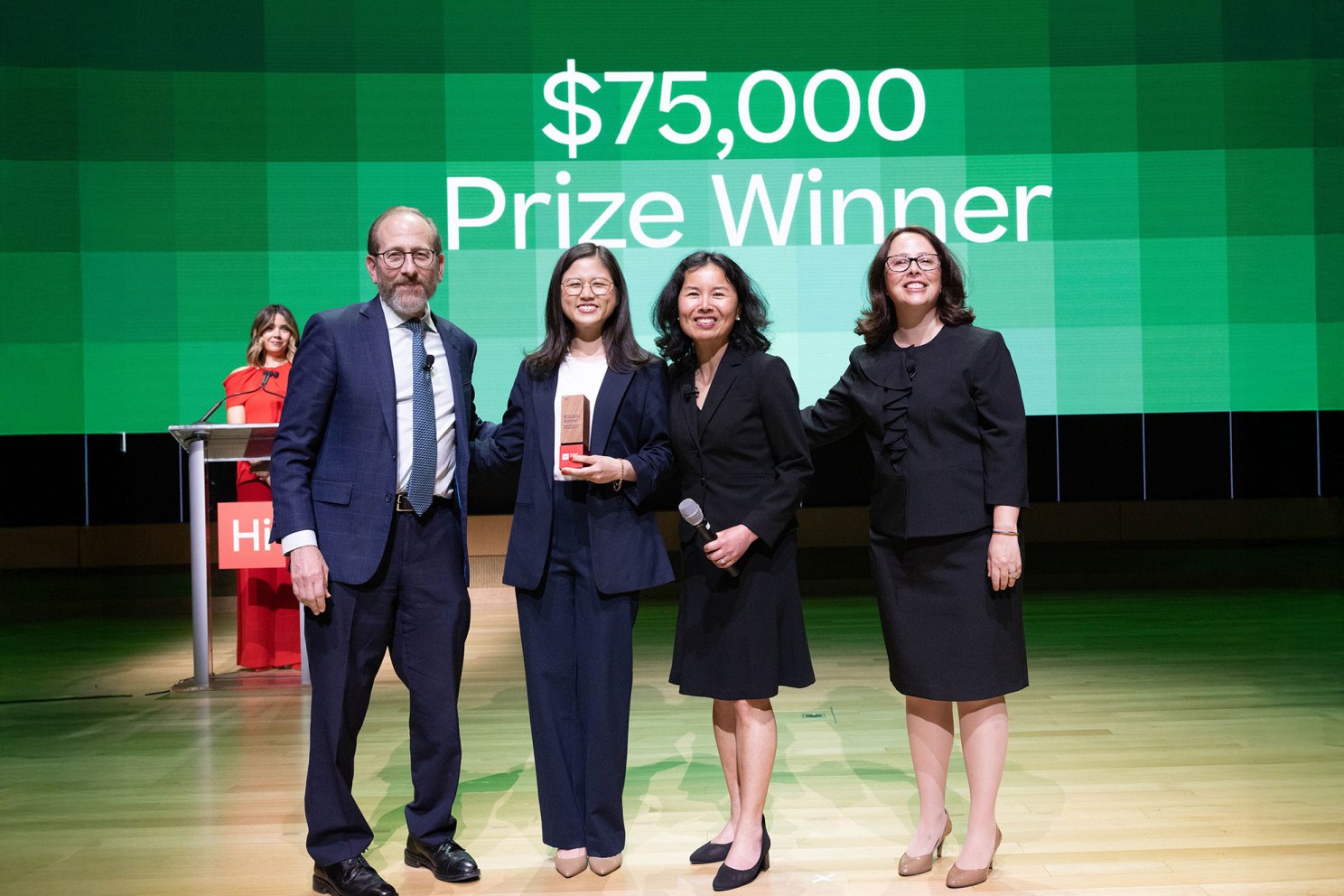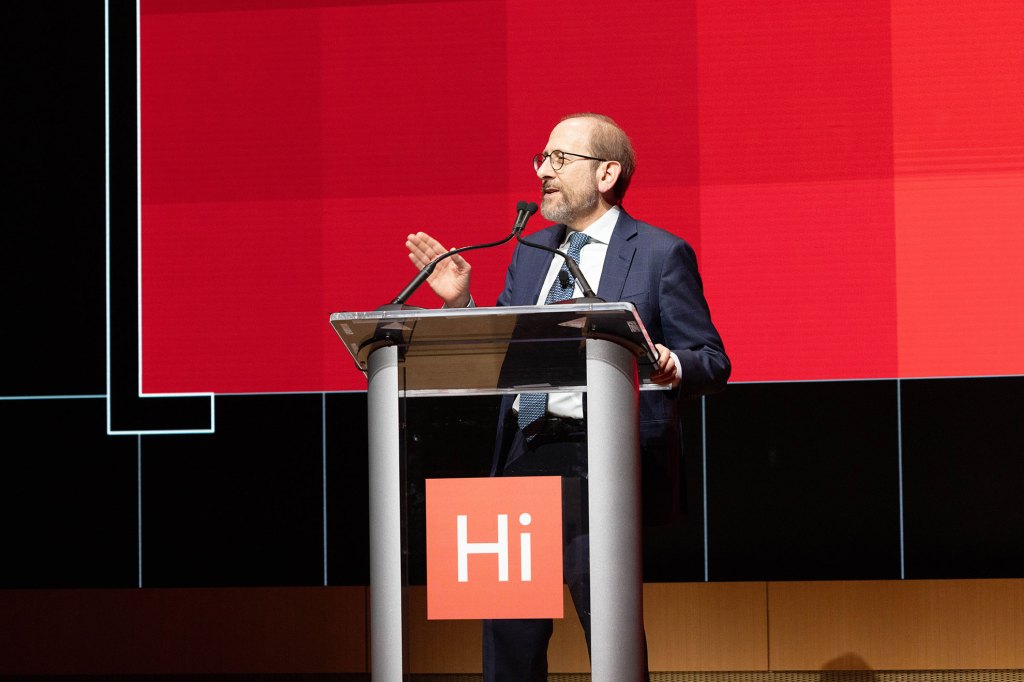Redefining what’s possible

President Alan Garber (from left) with Tess Kim, founder of PeriPeach, which received a $75,000 award, and Harvard i-lab Managing Director Becca Xiong, and Senior Director Meagan Hall.
Photos by Evgenia Eliseeva
President’s Innovation Challenge provides winners with support at the earliest stages of their ventures
Helping mothers protect their bodies during childbirth, reimagining how hydrogen can be transported safely and affordably, and leveraging AI and robotics to transform the thousands-year-old process of hair braiding are a few of the 2025 Harvard President’s Innovation Challenge’s extraordinary winning ventures.
“At a time when so much is uncertain, the possibility of redefining what’s possible is not only a springboard to your own achievements, but also a gift to our community, our nation and our world,” said President Alan Garber. “Your willingness to pursue ideas, to take risks and to carve new paths to excellence reminds us all of the power of knowledge, and the importance and necessity of places like Harvard.”
The President’s Innovation Challenge is an annual competition for Harvard students and select alumni and affiliates pursuing ventures that are redefining what’s possible in their fields. During the Wednesday awards ceremony at Klarman Hall, President’s Innovation Challenge finalists pitched their ventures to a global audience of more than 2,000 in-person and virtual attendees. Winners received a share of $517,000 in non-dilutive funding, made possible by a gift from the Bertarelli Foundation, co-founded by Ernesto Bertarelli, M.B.A. ’93.
“Each year, the Harvard President’s Innovation Challenge showcases the incredible creativity and impressive drive of students from across the University,” said Bertarelli. “It’s been an immense honor to support these founders at the earliest stages of their ventures and see how they go on to make a positive impact to society.”
“Your willingness to pursue ideas, to take risks and to carve new paths to excellence reminds us all of the power of knowledge, and the importance and necessity of places like Harvard.”
President Alan Garber

$75,000 award recipients
Gurus Inc. (Harvard T.H. Chan School of Public Health): Providing vulnerable populations with housing, education, mentorship, and support services.
Halo Braid (Harvard Business School, Harvard College, Harvard John A. Paulson School of Engineering and Applied Sciences): Building an AI-powered robotic hair braider that reduces braiding time from hours to minutes, empowering hair stylists to double their business.
PeriPeach (Harvard Medical School): Designing a medical device to prevent severe tears from childbirth.
Regatta Bio (Harvard Medical School): Developing cellular therapies to restore immune tolerance and prevent immune system-related diseases.
The Paal (Harvard Kennedy School): Improving financial outcomes for smallholder livestock farmers in India.
“Advocacy and awareness has always been a central part of PeriPeach, and I want to thank everybody here today,” said Tess Kim, founder of PeriPeach, after receiving the $75,000 prize. “This is for all the women who had to suffer with severe tears and for all the women who won’t have to.”
$25,000 award recipients
Adaptive Reader (Harvard College): Reimagining books so that every learner is able to engage with rigorous content, using AI to personalize languages and reading levels.
Brain Exercise Initiative (Harvard Law School): Preventing memory loss with cognitively stimulating exercises.
HydroHaul (Harvard Business School): Building a safer, more reliable, and cheaper solution for transporting hydrogen using a proxy carrier molecule.
Modulate Bio (Harvard Business School): Developing therapies to treat neurological disorders, including Essential Tremor, epilepsy, and anxiety.
Radiate Biosciences (Harvard Medical School): Creating a new colorectal cancer screening method with a blood test that delivers colonoscopy-level performance.
Ingenuity award winners
AIRQUA (Harvard Graduate School of Design, Harvard John A. Paulson School of Engineering and Applied Sciences): Transforming flood relief with air-generated water technology, delivering clean, safe water to families in urgent need during crises.
Pythia Diagnostics (Harvard College, Harvard John A. Paulson School of Engineering and Applied Sciences): Making a wearable device that predicts epileptic seizures by analyzing skin-released chemicals.
SAMI+ (Harvard T.H. Chan School of Public Health): Equipping health workers in the Democratic Republic of the Congo with AI-powered handheld ultrasounds, enhancing prenatal care.
SpiroSniff (Harvard College, Harvard John A. Paulson School of Engineering and Applied Sciences): Creating an affordable breathalyzer to detect lung cancer early, using sensors and AI for rapid, non-invasive, accessible screening.
Wyndergy (Harvard Extension School): Harnessing wind power to increase range for electric vehicles and eliminate range anxiety.
“Today is one of our favorite days of the year,” said Becca Xiong, managing director of programs and engagement at the Harvard Innovation Labs. “We get to celebrate bold ideas, real-world impact, and the remarkable people behind both. It takes vision, courage, and a lot of hard work to reach this stage — and even more to bring that vision to life.”
To learn more about the President’s Innovation Challenge finalists and winners, and watch a recording of the May 7 awards ceremony, visit the Harvard Innovation Labs website.




